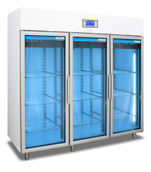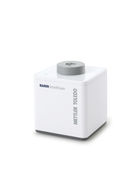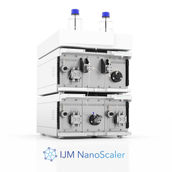History of Human Migration to be Mapped
Applied Biosystems Joins the Genographic Project to Support Landmark Population Genetics Study Mapping the History of Human Migration
Advertisement
Applied Biosystems and the Genographic Project announced that Applied Biosystems has joined the Genographic Project as a supporting sponsor. Applied Biosystems has signed a multi-year agreement with the project to provide laboratory research equipment and services to each of the ten participating global research centers. The company's technology will be used to aid in the generation of one of the world's largest databases of information about the sources of humankind's diversity. The terms of the agreement were not disclosed.
The Genographic Project is a ground-breaking research partnership of the National Geographic Society and IBM to map the history of human migration, with global field science supported by the Waitt Family Foundation.
Applied Biosystems brings a 25-year history of groundbreaking life science innovation to the project, including the development of the technologies that enabled the historic sequencing of the human genome. The company's DNA analysis technologies - including instruments that sequence DNA, detect genetic variations and identify patterns of inheritance -will enhance the ability of the Genographic Project to analyze DNA from more than 100,000 individuals from indigenous and traditional populations with whom researchers will be collaborating in this landmark study.
Theodore Schurr, Ph.D., principal investigator of the North American Regional Center for the Genographic Project and assistant professor in the department of anthropology at the University of Pennsylvania in Philadelphia, is the first project researcher to receive the state-of-the-art equipment from Applied Biosystems. "My international colleagues and I all agree that this dedicated laboratory equipment will expand our research efforts tremendously," said Dr. Schurr. "It will not only accelerate the rate and promote the accuracy of our genetic analyses, but also greatly amplify the breadth of work that we can do for the Genographic Project."
The other laboratories that will perform the DNA analysis for the project are located at: the Universidade Federal de Minas Gerais (Brazil), Institut Pasteur (France), Universitat Pompeu Fabra (Spain), American University of Beirut Medical Center (Lebanon), Russian Academy of Medical Sciences (Russia), La Trobe University (Australia), Fudan University (China), Madurai Kamaraj University (India), National Health Laboratory Service (South Africa), and the Australian Centre for Ancient DNA at the University of Adelaide (Australia).
Researchers at these global regional field research sites will use Applied Biosystems technology to analyze DNA samples from indigenous and traditional populations around the globe. DNA from these groups is important to the project because it contains key genetic markers that have remained relatively unaltered over hundreds of generations. Analysis of these markers should help researchers understand humankind's diversity resulting from approximately 60,000 years of global migration. Analysis of the collected samples is purely for anthropological research purposes.
"Understanding the genetic variations that have occurred over thousands of years of migration and evolution will help us to understand modern-day human diversity, from the way we look to the various languages we speak," said Spencer Wells, Ph.D., project director for the Genographic Project. "Applied Biosystems is an ideal supporting sponsor for us in this ambitious initiative because of its long track record of success in applying science and technology to the challenges of DNA analysis."
In addition to providing the suite of research technologies that will be used in the project, Applied Biosystems also will provide equipment training, service and logistical supply support to the world-wide research laboratories.
"The discovery and characterization of meaningful genetic variations has become a principle focus for life science research," said Catherine M. Burzik, president of Applied Biosystems. "This project, with a mission to help explain those variations that have contributed to the rich genetic diversity of our species, is well aligned with our corporate commitment to advancing the many applications of life science technology that can benefit society."
Members of the general public can take part in the project by purchasing a Genographic Project Public Participation Kit and submitting their own cheek swab sample, enabling them to track the overall progress of the project as well as learn their own migratory history. Data from the Genographic Project eventually will be made public in a form that does not reveal the identity of participants. Proceeds from kit sales support the Genographic Legacy Fund and incremental field research.




























































